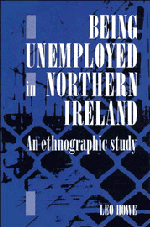Book contents
- Frontmatter
- Contents
- List of tables
- Acknowledgements
- List of abbreviations
- 1 Introduction
- 2 The political economy of Northern Ireland and the anthropology of sectarianism
- 3 Doing the double in Belfast: the general picture
- 4 Doing the double or doing without
- 5 The ‘deserving’ and the ‘undeserving’: administrative practice in a social security office
- 6 Claimants and the claiming process: the reluctant claimant
- 7 Claimants and the claiming process: the assertive claimant
- 8 The employed and the unemployed: conflict, discourse, and ideology
- 9 Conclusion
- Notes
- List of references
- Index
3 - Doing the double in Belfast: the general picture
Published online by Cambridge University Press: 04 May 2010
- Frontmatter
- Contents
- List of tables
- Acknowledgements
- List of abbreviations
- 1 Introduction
- 2 The political economy of Northern Ireland and the anthropology of sectarianism
- 3 Doing the double in Belfast: the general picture
- 4 Doing the double or doing without
- 5 The ‘deserving’ and the ‘undeserving’: administrative practice in a social security office
- 6 Claimants and the claiming process: the reluctant claimant
- 7 Claimants and the claiming process: the assertive claimant
- 8 The employed and the unemployed: conflict, discourse, and ideology
- 9 Conclusion
- Notes
- List of references
- Index
Summary
Introduction
The ‘abuse’ of welfare benefits by the unemployed takes four basic forms. The first is fraud, properly speaking, and concerns claimants who intentionally withhold information or make false statements bearing on their employment status and/or their net income. A quite different form of ‘abuse’, defined in moral rather than in legal terms, is constituted by claimants who allegedly exploit the system in a determined effort to obtain, irrespective of ‘real’ need, any and every available benefit. Malingering or scrounging is a related form of abuse, purportedly identifying claimants who could make private provision for themselves (e.g. by obtaining a job) but prefer rather to be state supported. A final form of abuse involves tampering with the payment instrument (giro cheque, for example), but this is comparatively rare and easily detected.
The issue of ‘working while claiming’ is addressed in this and the following chapter. Discussion of the alleged exploitation of the benefit system requires an examination of processes of benefit administration in social security offices, which is the subject of chapter 5. Malingering, finally, can only be considered in relation to the labour market and the levels of wages and benefits, topics which are explored throughout the book.
In Northern Ireland ‘doing the double’ refers to the practice of claiming SB (and/or unemployment benefit) while undertaking undeclared paid work. Conviction for such fraud carries a penalty of a fine or possibly a term of imprisonment.
- Type
- Chapter
- Information
- Being Unemployed in Northern IrelandAn Ethnographic Study, pp. 47 - 76Publisher: Cambridge University PressPrint publication year: 1990

